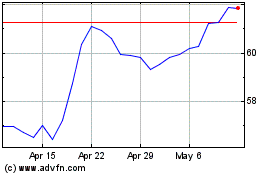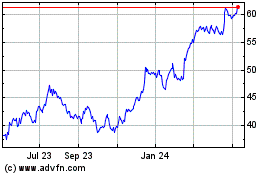By Chip Cutter
What's wrong with Corporate America? Just ask Warren
Buffett.
The chairman and CEO of Berkshire Hathaway Inc. and his longtime
business partner, Charlie Munger, spent the weekend riffing on
highly paid corporate board members who aren't truly independent;
committee meetings that waste time; and best practices embraced by
managers that may not necessarily work.
The billionaires share a long, colorful history of critical
comments. They have made a tradition of doling out advice and
tossing off bon mots at Berkshire's annual meeting in Omaha, Neb.,
which is attended by thousands of shareholders and watched live
online by many more.
In the past, Messrs. Buffett and Munger, who are 88 and 95,
respectively, have sounded off on the dangers of consultants,
meetings, PowerPoint presentations and corporate bloat. In 2016,
Mr. Buffett said American companies are "loaded with people that
aren't really doing anything or are doing the wrong thing."
At this year's event, during a multihour Q&A session with
investors, they praised Berkshire's corporate culture and took jabs
at the way other companies operate, including a critique of
management incentives at Wells Fargo & Co. that contributed to
a series of scandals at the bank. (Berkshire is Wells Fargo's
largest shareholder.)
Berkshire is a conglomerate that employs about 390,000 people.
Its businesses include the insurance company Geico, furniture
businesses and a wide range of other companies, such as See's
Candies. Those subsidiaries have long operated largely
independently, although they are now quietly collaborating
more.
Even though Mr. Buffett directed some of this year's questions
to Greg Abel and Ajit Jain, his possible successors for the CEO
role, he emphasized that Berkshire's culture will endure after he
and Mr. Munger are gone. The company isn't interested in activities
that "don't actually let us run the business better," Mr. Buffett
said.
When asked how Berkshire would score on measures of
environmental, social and governance investing that are lauded by
asset managers including BlackRock Inc., Mr. Buffett said he
believed Berkshire would fare well. But he added that he was
uninterested in the paperwork and questionnaires needed to measure
such performance.
"We don't want to be preparing a lot of reports and asking 60
subsidiaries each to do something," he said. "They'll set up a
team, then mail things to headquarters, and then we'll supply them
to somebody who, if our stock goes up some, is probably going to
sell it anyway. We want our managers to do the right things. We
give them enormous latitude to do that, and I think that our
batting average really is quite good."
Mr. Munger issued this warning: "The so-called best corporate
practices -- I think the people who talk about them don't really
know what the best practices are."
"I like our way of doing things better than theirs, and I hope
to God we never follow their best practices," he added.
The Berkshire way includes a disdain for PowerPoint
presentations. In 2016, Mr. Buffett claimed to have not seen one at
his company.
"We don't have make-work activities," he said.
Berkshire takes a dim view of consultants. In 2017, Mr. Munger
derided those who advise on pay, saying, "I hardly can find the
words to express my contempt." That same year, Mr. Buffett
threatened to come back from the grave should a compensation
consultant be hired after his death.
This year Mr. Buffett took aim at corporate board members,
saying many had become accustomed to their big paydays, rendering
them incapable of being truly independent. In contrast, Berkshire
pays its directors between $3,300 and $7,300, depending on which
committee they sit on.
Directors who earn $250,000 annually to serve on a board
probably want little more than for the CEO to recommend them for
additional paid board seats elsewhere, Mr. Buffett said. "How in
the world is that independent?" Meanwhile, directors who break rank
and speak out typically find themselves on the outs with their
peers. "You don't get invited to be on boards if you belch too
often at the dinner table," he said.
The ideals presented by Messrs. Buffett and Munger still
resonate with some younger executives.
"People view them as perfect grandfathers," said Chad Sandstedt,
chief executive at TagniFi, a financial data platform. "They have
answers for everything."
Anand Sanwal, chief executive of the technology company CB
Insights, attended his first Berkshire meeting in person this year.
He described the event as part of his "nerd bucket list" and got up
at 3 a.m. Saturday to get in line.
He said he was struck by Mr. Buffett's emphasis on hiring
high-quality managers and then getting out of their way. Mr.
Buffett bragged in 2018 about speaking to the CEO of a Berkshire
unit only three times in a decade aside from chance meetings.
Mr. Sanwal said his company is five times larger today than it
was three years ago, with 250 employees, and needs to make good
decisions quickly, hiring managers capable of making the right
calls.
"That's super important to us," he said.
Write to Chip Cutter at chip.cutter@wsj.com
(END) Dow Jones Newswires
May 07, 2019 08:08 ET (12:08 GMT)
Copyright (c) 2019 Dow Jones & Company, Inc.
Wells Fargo (NYSE:WFC)
Historical Stock Chart
From Mar 2024 to Apr 2024

Wells Fargo (NYSE:WFC)
Historical Stock Chart
From Apr 2023 to Apr 2024
